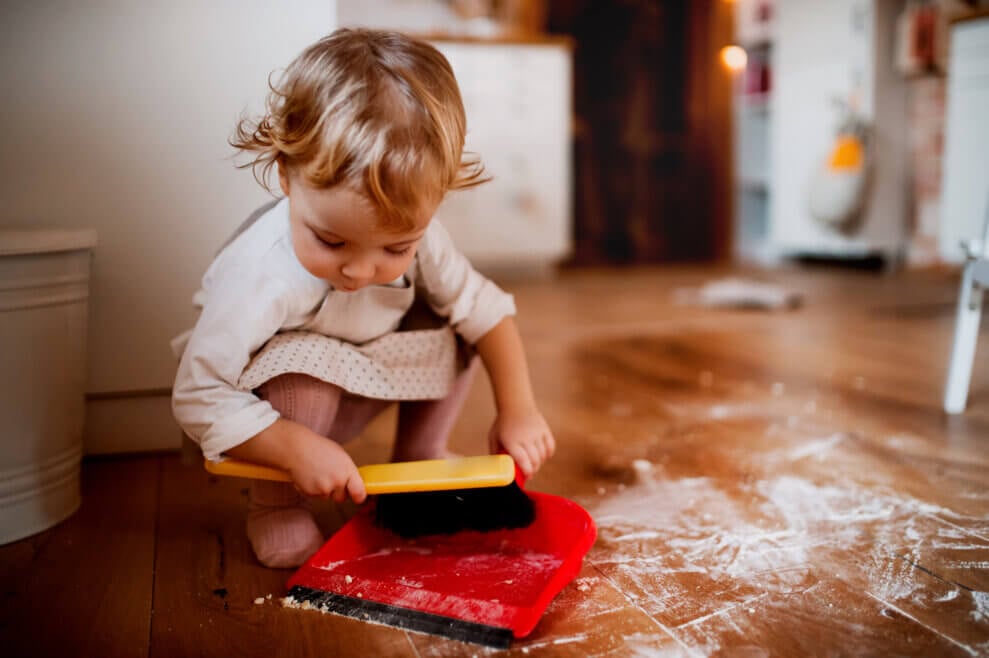
Age-appropriate chores for kids: Building life skills for future success
You can build independence and a sense of responsibility in your kids—from toddlers to tweens—by assigning them age-appropriate chores.
It’s my four-year-old’s job to put the cutlery away every morning when we empty the dishwasher. Believe it or not, it’s actually been one of her family jobs since she was two. The forks and spoons didn’t always end up where they were supposed to, but now she knows exactly where everything belongs and she feels proud to be contributing to the family’s workload (and we’re grateful for the help!).
Chores not only help children develop essential life skills but also foster a sense of teamwork and contribution to the family. It may seem strange to assign your two-year-old tasks, but we actually do our kids a disservice by not trusting them to contribute. Taking responsibility for family chores makes kids feel like they’re part of an ecosystem that works together to keep everything running smoothly.
And, naturally, when children do chores, they’re moving and expending energy. And most chores help them develop movement skills like manipulation and balance. Check the lists below for some ideas of age-appropriate chores for your child.
Toddler chores (ages 2 to 3)
Toddlers are probably the most eager when it comes to chores. (“I get to use the vacuum!?”) And this is a good time to lay the groundwork for future expectations. At this age, chores are more about creating routine and consistency, but you may find that your toddler is actually helpful. Have them try one of these options to start:
- Matching up socks
- Throwing used diaper in the pail
- Putting toys in bins
- Setting the table
- Sorting cutlery
- Sweeping with a child-sized broom

Preschooler chores (ages 3 to 5)
When it comes to chores, preschoolers genuinely just want to be part of the family unit and mimic what their parents are doing. Some options include:
- Feeding pets
- Clearing the table
- Filling water cups for everyone at dinner time
- Tidying toys
- Sorting their laundry into a pile and putting it away in their closet (note: it probably won’t be perfectly folded, and that’s not the goal!)
Middle-schooler chores (ages 6 to 10)
As children grow older, they can take on more substantial responsibilities. School-age kids can handle chores that require a bit more attention to detail. These are just some ideas, but there are many more options, especially ones that are unique to your own family (like washing sports equipment, for example).
- Making their beds (this is a skill they’ll have to practice, and again the goal is not perfection)
- Vacuuming or sweeping under the table when crumbs accumulate (especially helpful if you don’t have a dog)
- If you do have a dog, kids can be in charge of walking them (if the dog is trained) and picking up waste
- Emptying trash cans and replacing the bag or liner
- Organizing laundry. In our house, we rarely fold clothing. Instead, all three kids are given the basket of clean laundry and told to find their clothes and put them away (folding is optional and done by preference of each kid) and they’re all equally responsible for folding sheets and towels and putting the household items away.
- Watering indoor plants and weeding the garden outdoors
- Making a grocery list and helping with the shopping
- Loading the dishwasher
- Peeling vegetables for dinner
- Changing the toilet paper roll and cleaning the toilet
- Making a simple dinner (like eggs and toast)
- Emptying their own backpacks and lunch bags and putting everything in its appropriate place

Family chore mindset
When you first institute chores, there might be some (or a lot) of pushback from your kids. It’s important to approach chores as a family activity that you embark upon together. Kids often don’t know how to clean their room or load the dishwasher if they’ve never done it. Always start a new chore by teaching them and working alongside them before they attempt to do it by themselves.
To bribe or not to bribe?
There’s a big difference between saying, “If you don’t clean that up, no screen time for a week!” and saying, “Once we’re all done putting these things away, we’re going to enjoy a relaxing family movie night together.” One is a threat, the other is incentive. We all enjoy the rewards of our hard work, and there’s nothing wrong with a little motivation.
Weekly chore charts can also help with this. For every chore your child completes on their weekly chore chart, they get a sticker. Once the chart is full, they get a reward of your choice, whether it’s a movie night, a fun outing, or a book they’ve been wanting.
Beginning a family chore routine isn’t always easy, and for our family, it’s still not always seamless, but it feels so good to work together as a family to get things done so we can effectively function in our space. The most important thing to remember is that chores should never be about perfection or attaining some unrealistic aesthetic. The goal of chores is to make sure our space is cared for—so the people in it feel cared for too.



